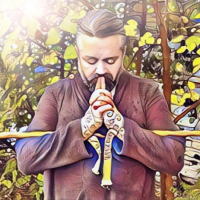- Posts: 2291
Where Do You a Draw the Line?
- Alethea Thompson
-
 Topic Author
Topic Author
- Offline
- User
-

Less
More
30 Sep 2014 00:09 #162603
by Alethea Thompson
Gather at the River,
Setanaoko Oceana
Where Do You a Draw the Line? was created by Alethea Thompson
This one sort of came up in conversation with Charles (LightningStrike) today, and then I connected with a very dear friend I had lost touch with over the years that brought the question to mind again.
Say your deity (those of you that don't follow one, let's just say one that is more powerful than you) came and bid you do their work. You get a choice because you have free will, but there will be horribly negative consequences (anything but death) inflicted by that deity for anything you choose not to do- until you finally decide to go forward with the task.
At what point do you tell the deity to take a hike? How much trust do you put in the deity?
Then, consider this- say you die after years of torment because of that decision and you learn that your decision cost more than the toll you personally took on- would you still consider your decision worth it?
Why?
Say your deity (those of you that don't follow one, let's just say one that is more powerful than you) came and bid you do their work. You get a choice because you have free will, but there will be horribly negative consequences (anything but death) inflicted by that deity for anything you choose not to do- until you finally decide to go forward with the task.
At what point do you tell the deity to take a hike? How much trust do you put in the deity?
Then, consider this- say you die after years of torment because of that decision and you learn that your decision cost more than the toll you personally took on- would you still consider your decision worth it?
Why?
Gather at the River,
Setanaoko Oceana
Please Log in to join the conversation.
- Breeze el Tierno
-

- Offline
- User
-

Less
More
- Posts: 3208
30 Sep 2014 00:19 #162604
by Breeze el Tierno
Replied by Breeze el Tierno on topic Where Do You a Draw the Line?
1. How is Charles? I hope he is well!
2. Should we assume the deity is asking us to do something that either seems wrong or like a really bad idea?
2. Should we assume the deity is asking us to do something that either seems wrong or like a really bad idea?
Please Log in to join the conversation.
30 Sep 2014 00:34 - 30 Sep 2014 00:35 #162607
by Adder
Replied by Adder on topic Where Do You a Draw the Line?
I guess the deity would need to subscribe to certain values, and if it acted outside them... then if its not a benefit for the system if represents, its a hazard to it and would no longer exist in that role.
If it claimed knowledge of causality beyond my comprehension I still would be bound by my own 'boundaries' to determine effect within my own causal domain. It's the only distinction I can make between rationality and irrationality, and any deity that demanded apparent irrational action would truly be using me as a slave. No one should be forced to be a slave, acting blindly on orders - even if the slavery is bounded by faith in some unseen morality - it would be removing all that represents the self.
If it claimed knowledge of causality beyond my comprehension I still would be bound by my own 'boundaries' to determine effect within my own causal domain. It's the only distinction I can make between rationality and irrationality, and any deity that demanded apparent irrational action would truly be using me as a slave. No one should be forced to be a slave, acting blindly on orders - even if the slavery is bounded by faith in some unseen morality - it would be removing all that represents the self.
Last edit: 30 Sep 2014 00:35 by Adder.
Please Log in to join the conversation.
- Alethea Thompson
-
 Topic Author
Topic Author
- Offline
- User
-

Less
More
- Posts: 2291
30 Sep 2014 02:55 #162622
by Alethea Thompson
Gather at the River,
Setanaoko Oceana
Replied by Alethea Thompson on topic Where Do You a Draw the Line?
Cabur: Maybe, maybe not. There is nothing to say that the dowry will ever ask you to do something outside your moral grounds. Merely, what would it take for you to tell said deity your done with it?
Gather at the River,
Setanaoko Oceana
Please Log in to join the conversation.
30 Sep 2014 05:18 #162625
by Gisteron
Better to leave questions unanswered than answers unquestioned
Replied by Gisteron on topic Where Do You a Draw the Line?
No amount of power makes a person or his choices correct. Presuming that they still are, I have to still operate within the scope of what I perceive and can do. Some of the faithful camp will tell us that morality is based on their deity or its nature yet none of them could so far answer how they came to understand that their god is the good and not the evil one of the story other than by their own moral compass or on no grounds whatever.
The mere fact that this hypothetical deity would threaten me with horrible consequences to anyone for what I choose not to do for it takes away all love and all respect for that deity out of me. I find the concept of worship repulsive to begin with, but I will even less be coerced into it, and if people will suffer for it, that'll be his choice, not mine. I might have trouble living with myself knowing what I could have prevented, but if I did I wouldn't retain any dignity to be called a self to live with; and yes, you have permission to call this selfish if you want.
I'm easy to be asked, I'm somewhat harder to be ordered, but coersion with threats of violence is just not a way of talking to me, whatever the demand may be. I draw my lines pretty early on this one.
This is an ideological and purely theoretical stance. I realize that in practice even a mere mortal human could coerce me into a thing or two by, say, threatening people I love, for I am, too, bound by the same attachments and emotions as the rest of us.
The mere fact that this hypothetical deity would threaten me with horrible consequences to anyone for what I choose not to do for it takes away all love and all respect for that deity out of me. I find the concept of worship repulsive to begin with, but I will even less be coerced into it, and if people will suffer for it, that'll be his choice, not mine. I might have trouble living with myself knowing what I could have prevented, but if I did I wouldn't retain any dignity to be called a self to live with; and yes, you have permission to call this selfish if you want.
I'm easy to be asked, I'm somewhat harder to be ordered, but coersion with threats of violence is just not a way of talking to me, whatever the demand may be. I draw my lines pretty early on this one.
This is an ideological and purely theoretical stance. I realize that in practice even a mere mortal human could coerce me into a thing or two by, say, threatening people I love, for I am, too, bound by the same attachments and emotions as the rest of us.
Better to leave questions unanswered than answers unquestioned
Please Log in to join the conversation.
30 Sep 2014 06:02 #162629
by
Replied by on topic Where Do You a Draw the Line?
At a dinner party one night, a drunk Churchill asked an attractive woman whether she would sleep with him for a million pounds. “Maybe,” the woman said coyly. “Would you sleep with me for one pound?” Churchill then asked. “Of course not, what kind of woman do you think I am?” the woman responded indignantly. “Madam, we’ve already established what kind of woman you are,” said Churchill, “now we’re just negotiating the price.”
I wouldn't draw any lines.
Decisions come after negotiations, since it is established I have the ability to refuse, I also imagine I have the ability to haggle.
I imagine a deity would he able to make it worth my while.
Do not tempt the Lord.
Fine.
I however have no such reservations.
I wouldn't draw any lines.
Decisions come after negotiations, since it is established I have the ability to refuse, I also imagine I have the ability to haggle.
I imagine a deity would he able to make it worth my while.
Do not tempt the Lord.
Fine.
I however have no such reservations.
Please Log in to join the conversation.
30 Sep 2014 11:22 #162642
by Gisteron
Better to leave questions unanswered than answers unquestioned
Replied by Gisteron on topic Where Do You a Draw the Line?
The hypothetical deity in Alethea's scenario didn't offer a bribe. Only a threat.
Better to leave questions unanswered than answers unquestioned
Please Log in to join the conversation.
30 Sep 2014 11:58 #162647
by
Replied by on topic Where Do You a Draw the Line?
No, it didnt offer, but I can ask for one. At least, I assume so, given I have enough free will to outright refuse.
Please Log in to join the conversation.
